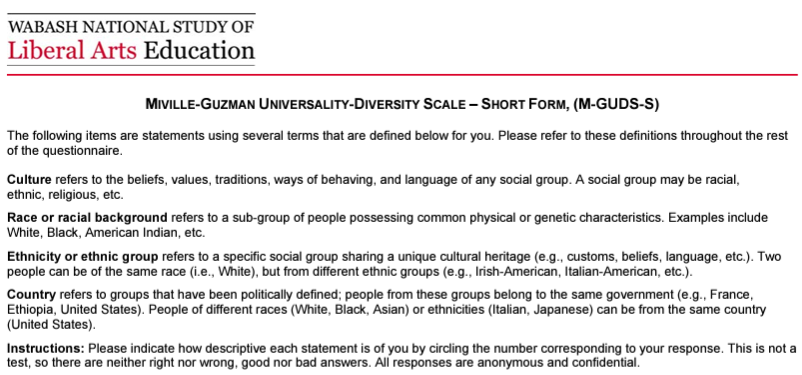Miville-Guzman Universality Diversity Scale

What is it and how does it work?
The Miville-Guzman Universality Diversity Scale - Short Form (MGUDS-S) is a 15-item self-report rating scale that measures the degree to which respondents report awareness and acceptance of similarities and differences across individuals (Miville et al., 1999; Fuertes et al., 2000). It has previously been validated with a range of populations including from diverse racial and ethnic backgrounds (Kegel & DeBlaere, 2014; Viljoen & Els, 2023).
Surveys may be administered multiple times in a semester to collect longitudinal data. Instructors can configure the survey to release results to students for feedback purposes.
Which skill(s) are targeted?
The Miville-Guzman Universality Diversity Scale - Short Form (MGUDS-S) can be used to collect students' self-report ratings of their own skills in the following competency areas:
- Consider, examine, and integrate differences between individual positions and the positions of others in multiple cultural contexts.
Who else has used it?
Although the Miville-Guzman Universality Diversity Scale - Short Form (M-GUDS-S) is frequently used in higher education contexts including the Wabash National Study of Liberal Arts Education, it has not yet been tested with CMU students. If you are interested in pilot testing this instrument, please email eberly-assist@andrew.cmu.edu.
 Educator time commitment
Educator time commitment
15 minutes
 Student time commitment
Student time commitment
3-5 minutes
Contact eberly-assist@andrew.cmu.edu for help with incorporating this resource.
Educator how-to steps
- Download and review the Miville-Guzman Universality Diversity Scale - Short Form (M-GUDS-S)
- Optional: Email eberly-assist@andrew.cmu.edu for assistance with pilot testing the instrument with your students.
Reference
Fuertes, J. N., Miville, M. L., Mohr, J. J., Sedlacek, W. E., & Gretchen, D. (2000). Factor structure and short form of the Miville-Guzman Universality-Diversity Scale. Measurement and Evaluation in Counseling and Development, 33(3), 157-169. https://doi.org/10.1080/07481756.2000.12069007
Kegel, K., & DeBlaere, C. (2014). Universal-diverse orientation in Asian international students: Confirmatory factor analysis of the Miville-Guzman Universality-Diversity Scale, Short Form. Cultural Diversity and Ethnic Minority Psychology, 20(3), 469–474. https://doi.org/10.1037/a0034746
Miville, M. L., Gelso, C. J., Pannu, R., Liu, W., Touradji, P., Holloway, P., & Fuertes, J. (1999). Appreciating similarities and valuing differences: The Miville-Guzman Universality-Diversity Scale. Journal of Counseling Psychology, 46(3), 291–307. https://doi.org/10.1037/0022-0167.46.3.291
Viljoen, C. & Els, C. (2023). A validation study of the Miville-Guzman Universality Diversity Scale in South Africa. South African Journal of Economic and Management Sciences 26(1), a4856. https://doi.org/10.4102/sajems.v26i1.4856